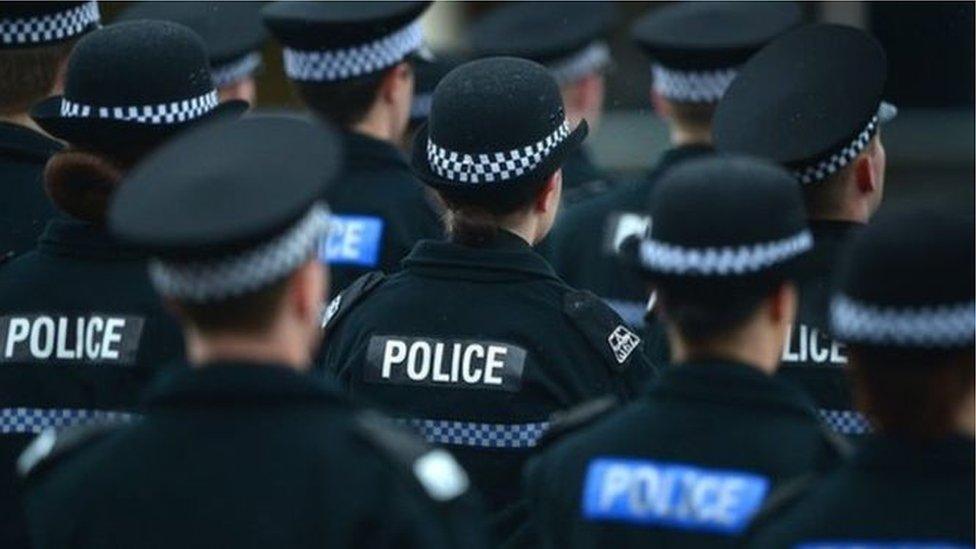Former Lord Advocate 'depressed' by police discrimination
- Published

A former Lord Advocate has said she was left "extraordinarily depressed" after hearing accounts of discrimination within Police Scotland.
Dame Elish Angiolini told MSPs the force must do more to challenge the "canteen culture" identified in her review into police complaints handling.
The QC also told MSPs her findings had left senior officers "horrified".
Chief Constable Iain Livingstone has promised to work to ensure the force is a welcoming career environment for all.
A spokesperson for Police Scotland also highlighted recent surveys indicating a high level of public confidence in the force.
Dame Elish appeared before the justice sub-committee on policing to discuss her 490-page review, which was published last month, external.
As well as calling for the Police Investigations and Review Commissioner (Pirc) to be given greater powers, the report highlighted concerns about the treatment of recruits from ethnic minorities, the LGBTI community and women.
'Sad reading'
MSP Rhoda Grant said the review made "sad reading" and suggested very little had changed since the publication of the Macpherson report, following the Stephen Lawrence Inquiry in 1999.
Asked if she felt racist attitudes were "embedded" in the force, Dame Elish replied that she could not answer that as she did not speak to all 273 Black, Asian and minority ethnic (BAME) officers in Police Scotland.
She added: "I don't think it is embedded in the sense there is an executive and senior officers who are determined to deal with this matter.
"I don't think that for a minute that is synthetic. I think they believe it in their heart."
However, the former Lord Advocate said a "canteen culture" existed in relation to racism and sexism, which required a "zero tolerance" approach to stamp it out.

Dame Elish Angiolini QC published her review into police complaints handling last month
Dame Elish said she was appalled by evidence from officers who felt they had to "blend in".
"We don't want people to blend in. We want a police force that is as diverse as our population," she said.
Her review found that minorities, women and LGBT members were sometimes subjected to "inappropriate quips or treatment".
"I think it is absolutely critical that that is not tolerated at all and I know the chief constable and his senior team are horrified and I think they have a real determination to deal with it," she told the committee.
In her report, Dame Elish said that, despite recruitment drives, some BAME officers had left the service early, with some blaming "the culture of the police and the way they were treated".
Her report contained 81 recommendations, including the expanded use of body cameras and for deaths in police custody to be treated with the same urgency as homicide investigations.
She acknowledged that financial resources were stretched due to the Covid pandemic but insisted change was necessary "so that Scotland has a system that the community and police officers can rely on and is trusted".
Code of ethics
Another of the recommendations is to place a legal duty on the Chief Constable and Scottish Police Authority to develop and publish a code of ethics that should be the "bread and butter" of policing in Scotland.
While such a code currently exists in Police Scotland, Dame Elish said: "Putting it into statute emphasises the importance of that, the importance of human rights."
Scotland is the only part of the UK where a code of ethics is not required under law and Dame Elish recommends legislation is introduced at Holyrood.
Police Scotland Chief Constable Iain Livingstone has said he would carefully consider the report's recommendations.
He added: "I agree it is crucial that the culture of Police Scotland is welcoming and inclusive to all and that we support all our people to thrive and flourish in what is an extremely demanding job.
"Police Scotland will continue to work with communities and other partners to relentlessly improve how we serve our fellow citizens and maintain their trust and support."
The Scottish Tories' justice spokesman Liam Kerr called on the Scottish government to put in place a "progress tracker" on its website for the 81 recommendations of the report.
Justice Secretary Humza Yousaf said this is "not a bad idea at all".
The tracker would list each recommendation and actions taken to implement it, along with the agency responsible for the changes.
Related topics
- Published11 November 2020

- Published21 June 2019
